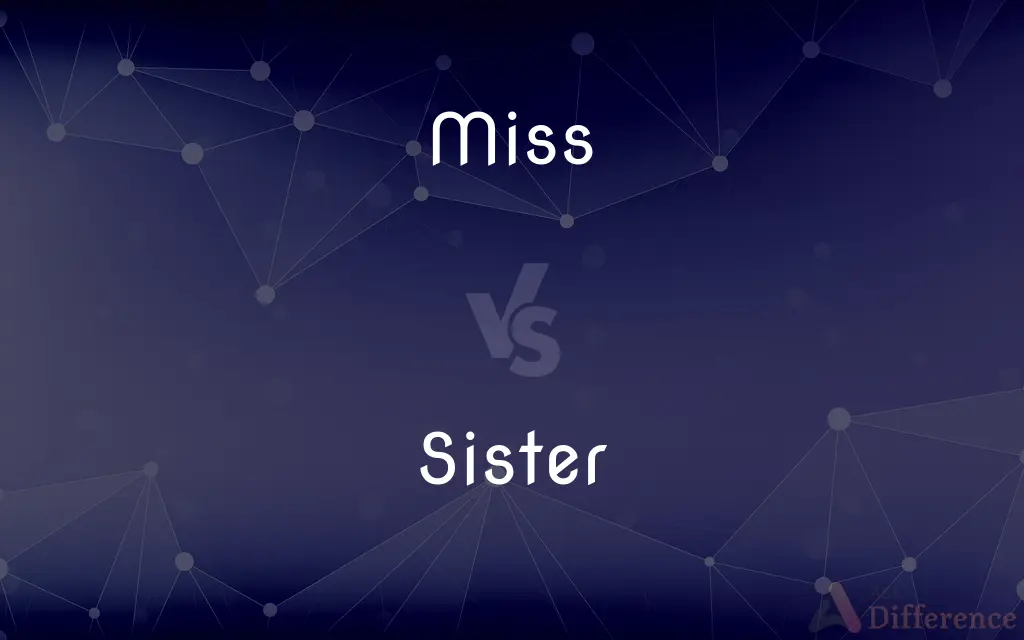Miss vs. Sister — What's the Difference?
Edited by Tayyaba Rehman — By Maham Liaqat — Updated on April 16, 2024
"Miss" is a formal title for an unmarried woman, reflecting her marital status, while "Sister" refers to a female sibling or, in religious contexts, a nun.

Difference Between Miss and Sister
Table of Contents
ADVERTISEMENT
Key Differences
"Miss" is traditionally used to address or refer to an unmarried woman, often before her first name or surname. It conveys respect while indicating her marital status. On the other hand, "Sister" primarily denotes a familial relationship between females sharing at least one parent, emphasizing a biological or adoptive link.
In formal and social settings, using "Miss" before a woman's name is a common etiquette, particularly in contexts where marital status is considered relevant. Whereas "Sister" is used informally among family members or formally within religious communities to denote membership or a spiritual bond.
The usage of "Miss" has evolved, and in contemporary contexts, it is often replaced by "Ms." to avoid referencing marital status. Conversely, "Sister" maintains its significance in both familial and religious contexts, symbolizing a close relational or spiritual connection.
In religious communities, particularly within Christianity, "Sister" is a title for a nun, indicating her dedication to religious life and community service. This use is vastly different from the secular title "Miss," which is not tied to any religious or spiritual affiliation.
While "Miss" is limited to addressing or referring to females based on their marital status, "Sister" can also signify deep bonds and shared commitments, such as in sororities or other close-knit groups, extending beyond family ties.
ADVERTISEMENT
Comparison Chart
Definition
Title for an unmarried woman
Female sibling or a nun
Usage Context
Formal, social introductions
Familial, religious, informal
Marital Connotation
Indicates unmarried status
None
Alternative Usage
Replaced by "Ms." in modern contexts
Also used for close non-biological relationships
Symbolism
Social status
Familial or spiritual bond
Compare with Definitions
Miss
Miss is a title used before a woman's last name or full name if she is unmarried.
Miss Smith will attend the meeting tomorrow.
Sister
Can indicate a close, sisterly bond in certain groups.
She's not just a friend; she's like a sister to me.
Miss
It is a sign of respect and formality in communication.
Please direct your questions to Miss Johnson, our guest speaker.
Sister
Sister refers to a female sibling.
Julia is my sister; we grew up together.
Miss
Historically, it indicates the marital status of a woman.
Traditionally, invitations addressed her as Miss Emily Porter.
Sister
Frequently used metaphorically to express solidarity among women.
She spoke of her colleagues as sisters in the struggle.
Miss
Often used in educational settings by students addressing female teachers.
Miss, may I please go to the library?
Sister
Used among women in religious orders.
Sister Maria devoted her life to charity work.
Miss
Can be seen as outdated or unnecessary in modern contexts.
Many opt for Ms. instead of Miss to avoid marital connotations.
Sister
In some cultures, a respectful term for older women.
In our community, we respectfully call elder women sister.
Miss
Miss (pronounced ) is an English language honorific traditionally used only for an unmarried woman (not using another title such as "Doctor" or "Dame"). Originating in the 17th century, it is a contraction of mistress, which was used for all women.
Sister
A sister is a woman or girl who shares one or more parents with another individual. The male counterpart is a brother.
Miss
To fail to hit, reach, catch, or otherwise make contact with
He swung at and missed the ball. The winger missed the pass. The ball missed the basket.
Sister
A female having the same parents as another or one parent in common with another.
Miss
To be too late for or fail to meet (a train, for example).
Sister
A kinswoman.
Miss
To fail to perceive, experience, or understand
I missed my favorite TV show last night. You completely missed the point of the film.
Sister
A woman fellow member, as of a sorority.
Miss
To fail to accomplish or achieve
Just missed setting a new record.
Sister
A fellow woman.
Miss
To fail to attend or perform
Never missed a day of work.
Sister
A close woman friend or companion.
Miss
To fail to answer correctly
Missed three questions on the test.
Sister
A fellow African American woman or girl.
Miss
To fail to benefit from; let slip
Miss a chance.
Sister
A woman who advocates, fosters, or takes part in the feminist movement.
Miss
To escape or avoid
We took a different way and missed the traffic jam.
Sister
(Informal) Used as a form of address for a woman or girl.
Miss
To discover the absence or loss of
I missed my book after getting off the bus.
Sister
A member of a religious order of women; a nun.
Miss
To be without; lack
A cart that is missing a wheel.
Sister
Used as a form of address for such a woman, alone or followed by the woman's name.
Miss
To feel the lack or loss of
Do you miss your family?.
Sister
Chiefly British A nurse, especially the head nurse in a ward.
Miss
To fail to hit or otherwise make contact with something
Took a shot near the goal and missed.
Sister
One identified as female and closely related to another
“the sisters Death and Night” (Walt Whitman).
Miss
To be unsuccessful; fail
A money-making scheme that can't miss.
Sister
(Architecture) A beam or other structural member affixed to another as a supplementary support.
Miss
To misfire, as an internal-combustion engine.
Sister
Related by or as if by sisterhood; closely related
Sister ships.
Sister cities.
Miss
A failure to hit or make contact with something.
Sister
(Genetics) Of or being one of an identical, related, or homologous pair
Sister chromatids.
Miss
A failure to be successful
The new movie was a miss.
Sister
(Architecture) To affix a beam or other structural member to (another) as a supplementary support.
Miss
The misfiring of an engine.
Sister
A daughter of the same parents as another person; a female sibling.
My sister is always driving me crazy.
Miss
Miss Used as a courtesy title before the surname or full name of a girl or single woman.
Sister
A female member of a religious order; especially one devoted to more active service; (informally) a nun.
Michelle left behind her bank job and became a sister at the local convent.
Miss
Used as a form of polite address for a girl or young woman
I beg your pardon, miss.
Sister
Any butterfly in the genus Adelpha, so named for the resemblance of the dark-colored wings to the black habit traditionally worn by nuns.
Miss
A young unmarried woman.
Sister
(British) A senior or supervisory nurse, often in a hospital.
Miss
Miss Used in informal titles for a young woman to indicate the epitomizing of an attribute or activity
Miss Organization.
Miss Opera.
Sister
Any woman or girl with whom a bond is felt through common membership in a community, race, profession, religion, organization, or ism.
Connie was very close to her friend Judy and considered her to be her sister.
Miss
Mis·ses A series of clothing sizes for women and girls of average height and proportions.
Sister
A black woman.
Miss
(ambitransitive) To fail to hit.
I missed the target.
I tried to kick the ball, but missed.
Sister
(informal) A form of address to a woman.
What’s up, sister?
Miss
(transitive) To fail to achieve or attain.
To miss an opportunity
Sister
A woman, in certain religious, labour or socialist circles; also as a form of address.
Thank you, sister. I would like to thank the sister who just spoke.
Miss
(transitive) To avoid; to escape.
The car just missed hitting a passer-by.
Sister
(attributively) An entity that has a special or affectionate, non-hierarchical relationship with another.
Sister publication
Sister city
Sister projects
Miss
(transitive) To become aware of the loss or absence of; to feel the want or need of, sometimes with regret.
I miss you! Come home soon!
Sister
(comptheory) A node in a data structure that shares its parent with another node.
Miss
(transitive) To fail to understand;
Miss the joke
Sister
Something in the same class.
Sister ships
Sister facility
Miss
(transitive) To fail to notice; to have a shortcoming of perception; overlook.
So I'm just going over my early notes, see if I missed anything.
Sister
To strengthen (a supporting beam) by fastening a second beam alongside it.
I’m trying to correct my sagging floor by sistering the joists.
Miss
(transitive) To fail to attend.
Joe missed the meeting this morning.
Sister
To be sister to; to resemble closely.
Miss
(transitive) To be late for something (a means of transportation, a deadline, etc.).
I missed the plane!
Sister
A female who has the same parents with another person, or who has one of them only. In the latter case, she is more definitely called a half sister. The correlative of brother.
I am the sister of one Claudio.
Miss
(transitive) To be wanting; to lack something that should be present.
The car is missing essential features.
Sister
A woman who is closely allied to, or assocciated with, another person, as in the sdame faith, society, order, or community.
Miss
To spare someone of something unwanted or undesirable.
Miss me with that nonsense!
Sister
One of the same kind, or of the same condition; - generally used adjectively; as, sister fruits.
Miss
To fail to help the hand of a player.
Player A: J7. Player B: Q6. Table: 283. The flop missed both players!
Sister
To be sister to; to resemble closely.
Miss
(sports) To fail to score (a goal).
Sister
A female person who has the same parents as another person;
My sister married a musician
Miss
To go wrong; to err.
Sister
(Roman Catholic Church) a title given to a nun (and used as a form of address);
The Sisters taught her to love God
Miss
To be absent, deficient, or wanting.
Sister
A female person who is a fellow member of a sorority or labor union or other group;
None of her sisters would betray her
Miss
A failure to hit.
Sister
Sometimes used as a term of address for attractive young women
Miss
A failure to obtain or accomplish.
Miss
An act of avoidance give}}
I think I’ll give the meeting a miss.
Miss
(computing) The situation where an item is not found in a cache and therefore needs to be explicitly loaded.
Miss
A title of respect for a young woman (usually unmarried) with or without a name used.
You may sit here, miss.
You may sit here, Miss Jones.
Miss
An unmarried woman; a girl.
Miss
A kept woman; a mistress.
Miss
(card games) In the game of three-card loo, an extra hand, dealt on the table, which may be substituted for the hand dealt to a player.
Miss
A title of courtesy prefixed to the name of a girl or a woman who has not been married. See Mistress, 5.
Miss
A young unmarried woman or a girl; as, she is a miss of sixteen.
Gay vanity, with smiles and kisses,Was busy 'mongst the maids and misses.
Miss
A kept mistress. See Mistress, 4.
Miss
In the game of three-card loo, an extra hand, dealt on the table, which may be substituted for the hand dealt to a player.
Miss
The act of missing; failure to hit, reach, find, obtain, etc.
Miss
Loss; want; felt absence.
There will be no great miss of those which are lost.
Miss
Mistake; error; fault.
He did without any great miss in the hardest points of grammar.
Miss
Harm from mistake.
Miss
To fail of hitting, reaching, getting, finding, seeing, hearing, etc.; as, to miss the mark one shoots at; to miss the train by being late; to miss opportunites of getting knowledge; to miss the point or meaning of something said.
When a man misses his great end, happiness, he will acknowledge he judged not right.
Miss
To omit; to fail to have or to do; to get without; to dispense with; - now seldom applied to persons.
She would never miss, one day,A walk so fine, a sight so gay.
We cannot miss him; he does make our fire,Fetch in our wood.
Miss
To discover the absence or omission of; to feel the want of; to mourn the loss of; to want; as, to miss an absent loved one.
Neither missed we anything . . . Nothing was missed of all that pertained unto him.
What by me thou hast lost, thou least shalt miss.
Miss
To fail to hit; to fly wide; to deviate from the true direction.
Men observe when things hit, and not when they miss.
Flying bullets now,To execute his rage, appear too slow;They miss, or sweep but common souls away.
Miss
To fail to obtain, learn, or find; - with of.
Upon the least reflection, we can not miss of them.
Miss
To go wrong; to err.
Amongst the angels, a whole legionOf wicked sprites did fall from happy bliss;What wonder then if one, of women all, did miss?
Miss
To be absent, deficient, or wanting.
What here shall miss, our toil shall strive to mend.
Miss
A young woman;
A young lady of 18
Miss
A failure to hit (or meet or find etc)
Miss
Fail to perceive or to catch with the senses or the mind;
I missed that remark
She missed his point
We lost part of what he said
Miss
Feel or suffer from the lack of;
He misses his mother
Miss
Fail to attend an event or activity;
I missed the concert
He missed school for a week
Miss
Leave undone or leave out;
How could I miss that typo?
The workers on the conveyor belt miss one out of ten
Miss
Fail to reach or get to;
She missed her train
Miss
Be without;
This soup lacks salt
There is something missing in my jewellery box!
Miss
Fail to reach;
The arrow missed the target
Miss
Be absent;
The child had been missing for a week
Miss
Fail to experience;
Fortunately, I missed the hurricane
Common Curiosities
Why might someone use "Ms." instead of "Miss"?
"Ms." is used to avoid specifying marital status, providing a neutral alternative to "Miss" or "Mrs."
What contexts are appropriate for using "Miss"?
"Miss" is suitable in formal settings, professional environments, and when addressing young women or girls.
How does "Sister" differ from "Miss" in terms of relationship implications?
"Sister" denotes a familial or spiritual relationship, unlike "Miss," which relates to marital status.
What is the significance of the title "Miss"?
"Miss" is a formal title used to address unmarried women, reflecting traditional respect and etiquette.
What are the modern attitudes towards using "Miss"?
Many consider "Miss" outdated due to its emphasis on marital status; "Ms." is often preferred for its neutrality.
Is it appropriate to call a nun "Miss"?
No, nuns are typically addressed as "Sister," reflecting their religious commitment.
Can "Miss" be used for a married woman?
No, "Miss" is specifically for unmarried women; "Mrs." is used for married women.
Does "Miss" have any religious connotations?
No, "Miss" is secular and used solely based on marital status and social conventions.
How do different cultures use the term "Sister"?
Beyond family, many cultures use "Sister" to denote respect for women within a community or in spiritual contexts.
How can "Sister" be used outside of familial terms?
"Sister" is also used to describe close female friendships, in sororities, and as a term of solidarity among women.
Share Your Discovery

Previous Comparison
Confer vs. Concur
Next Comparison
Hellenic vs. GreekAuthor Spotlight
Written by
Maham LiaqatEdited by
Tayyaba RehmanTayyaba Rehman is a distinguished writer, currently serving as a primary contributor to askdifference.com. As a researcher in semantics and etymology, Tayyaba's passion for the complexity of languages and their distinctions has found a perfect home on the platform. Tayyaba delves into the intricacies of language, distinguishing between commonly confused words and phrases, thereby providing clarity for readers worldwide.
















































